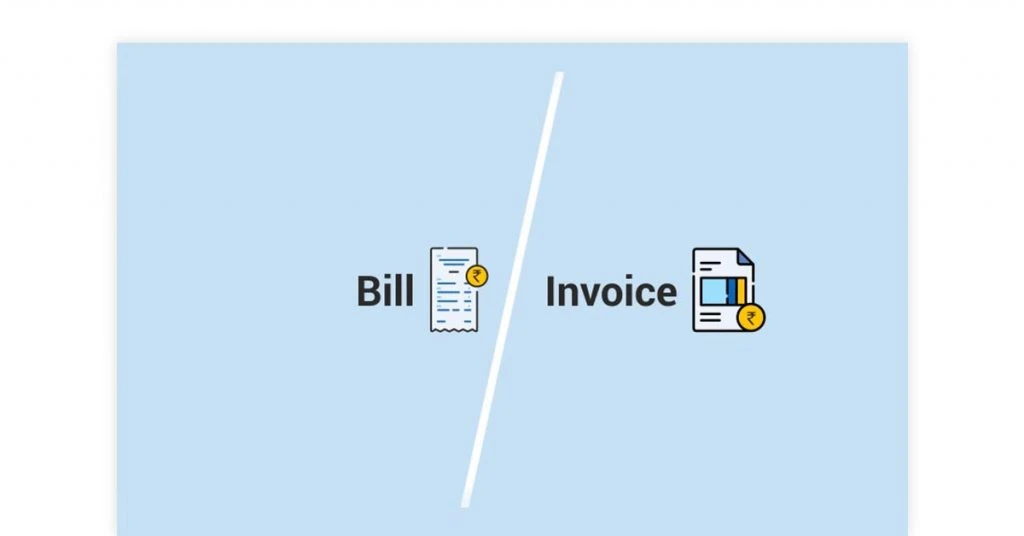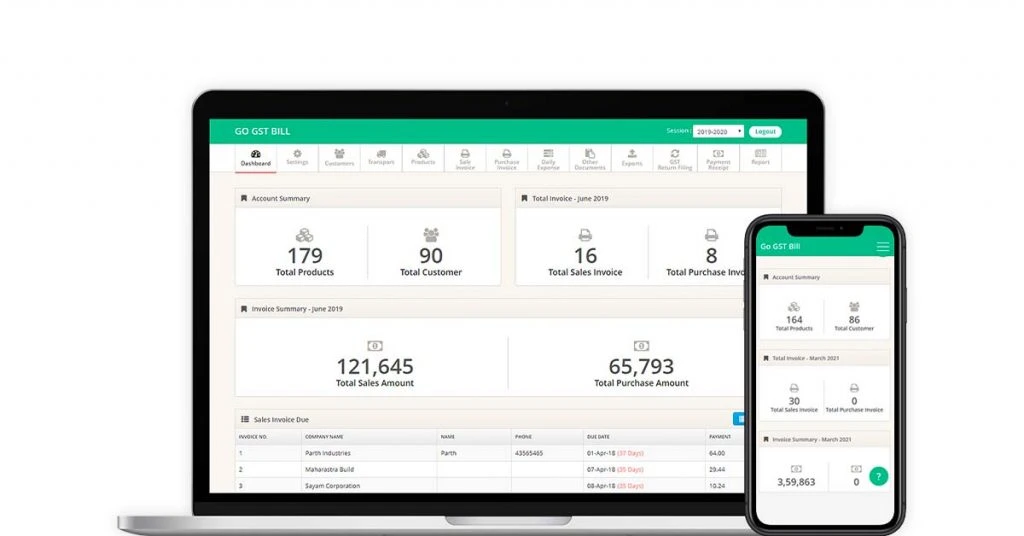Invoice is the primary document of business transactions, and every business in India directly or indirectly revolves around GST billing.
Most business owners in India believe that GST billing is simply preparing a document with the amount payable by customers, which includes the taxes chargeable on goods and services. While this is true to some extent, GST billing is a larger concept. Every accountant or self-employed person should have a deeper understanding of GST invoicing rules.
This blog intends to provide you with all the information related to online billing in GST with rules and examples. We will also discuss why is billing crucial and the difference between invoice and billing.
What Is Online Billing in GST?
Online billing or e-Billing is a method of sending bills and making payment electronically. Compared to paper-based billing, online billing in GST ensures faster payment and minimal scope of forgery.
GST Bill and Its Importance
It’s essential to understand what a Bill really is. Here are a few attributes of what an Invoice/ bill is:
- An invoice/bill is a document, whether in paper or electronic form
- Provided by a vendor to a client/customer
- Online billing in GST contains a detailed breakdown of goods sent or services sold/ provided to be sold/ provided
- Mentions the price, quantity, rate, discount, and taxes chargeable
- May or may not mention the date of transaction, terms of payment, due date of payment and delivery details
- Essential for both financial and legal purposes.

Invoices are vital for vendors and buyers to know the details and are also a crucial part of Indirect taxation in any county.
The purpose of an invoice extends beyond just providing a record of the transaction, payable amount, services and commitments. A tax invoice or GST invoice determines how much the customer/client is liable to pay the government for availing services.
Online Billing in GST not only serves as a record of transactions but can also be enforced legally on both parties. Bills are the most critical document for buyers and sellers and even for the government.
Bills vs Invoice: Are they Same or Different

There is no accurate definition of Bill and Invoice stated by any law or rulebook. While an Invoice or Tax Invoice is defined by section 31 of the CGST Act, 2017, it doesn’t differentiate it from a Bill. Generally, Bill and Invoice are used interchangeably.
As per the Central Board of Excise & Customs, a GST Invoice could also be referred to as a “Bill of Sale” or “Contract of Sale.”
However, there are a few commonly acknowledged differences between GST bills and invoices.
| Bills | Invoices |
| Bills are considered due for immediate payment when generated. Ex: POS bills in supermarkets, retail stores or service centers | Invoices are generally issued requesting payment from customers. It does provide a due date of payment Ex: Rent Invoice, Service Provide Invoice |
| Generated for onetime use | Invoices are often generated on a recurring basis. |
| Contains limited details of prices, items, and taxes | Contains all the details of transaction including date of supply, HSN/SAC codes, delivery method, Challan number, item wise breakdown of product/ services, details of buyer, etc. |
| Commonly used in B2C transactions | Often used in B2B transactions |
Compare Billing vs GST Billing
Normal Billing
When you are sending out invoices to customers, it is important to make sure that you include the following information: Date, invoice number, customer name and address, company name and address, invoice amount, due date, and discount.
However, when a business is not taxable under GST regime (turnover doesn’t exceed 40 Lakh in a year) could generate bills as per industry standards or as they like it. There are no specific rules or regulations that a normal bill should follow.
GST Billing
When it comes to generating invoices for the Goods and Services Tax (GST) in India, Indian government has outlined specific requirements for filing GST invoices and making it easier for businesses to comply.
Every business that is taxable under the GST regime needs to provide GST bills to clients/customers for every sale. Every bill must be generated under the rules drafted by the Central Board of Excise & Customs.
Suggested Read: Best GST Billing Software for Small Business in India
GST Invoicing Rules with Examples
Most of the rules related to online billing in GST are the billing and invoicing standards set by government, and includes significant components of the bill, signature, and format. Here are some significant factors that need to be considered while GST invoicing.
- Details of Supplier: Bill must have the legal name, address and GSTIN number of the seller/vendor.
Rules
- The name should be legal name of the business as mentioned in GST registration
- The address should be the registered address of a business.
- Invoice Number: Every Invoice must have a unique combination of letters and numbers.
Rules
- Every invoice number should be unique
- It should be in a Series of Consecutive number
- It can be a combination of numbers and alphabets
- A hyphen (-) or Slash (/) can be used to separate period
- Should have a unique number for each financial year

Example: For the first Bill of the year 2023, the invoice Number could be “2023-0001” or “23/0001”.. Similarly, the next Bill should be “2023-0002” or “23/0002”.
For the year 2024, the bill number should have unique number like “2024-XXXX” or “FY24-XXXXX”
- Date of Billing: The bill must be issued on a date on which the liability of payment arises for the client.
Rule: Date of billing can be before providing goods/services but should not be later than 30 days from the supply of goods or services.
For example, for goods sold on 1st March 2022, the billing date could be between 1St March 2022 and 31st March 2022. However, bill could also be raised before the goods are sold or shipped, if needed.
- Customer/Clients Details: GST invoice must have the recipient’s name, address, and GST details.
Rule:
- GSTIN must be mentioned for every registered client. Else the client won’t be able to claim ITC.
- In case the customer/client is unregistered, and the value of supply exceeds ₹ 50,000, delivery address must be mentioned along with the state and state code.
- HSN and SAC codes: The bill must mention HSN (Harmonized System Nomenclature) code for every good supplied and SAC (Service Accounting Code) for service. These codes determine the rate of GST chargeable on each item.
- Additional description of goods or services
- Rate and unit of goods
- The total value of supply (both goods and services)
- Taxable value (after trade Discount and Abatement
- GST rate (CGST, SGST or IGST) and Cess
Additional Online GST Billing Rules: GST could be charged after deducting the trade discount. However, GST liability won’t decrease for any cash discount offered by seller.
Example: If a seller offers a Trade discount of 25% on a good worth 100 rupees. GST would be charged on ₹ 75 (₹100-25% of 100).
However, if a seller offers 2% cash discount on Instant payment of the Bill of ₹ 100, there would be no change on GST implications.
- Clearly Mention if GST is payable on Reverse Charge Basis
- Signature of Authorized Personnel (Digital Signature in case of GST bills online generation)
Suggested Read: Best Free GST Billing Software
How is Invoicing Process Different from Creating an Invoice?
While an Invoice is a document, invoicing process is a much broader term that includes more than simply creating details of a transaction. It consists of the entire process of invoicing, from the initial contact to the final payment and even maintaining legal compliance. Invoicing process goes hand in hand with the sales cycle. It includes:
- Adding client details
- Deciding rates and discount policies
- Defining GST rates on products and services
- Generating Bills
- Accounting for returns and credit notes
- Tracking payments
- Managing, tracking, and updating Account payables
- Reconciling Statements
- Generating Tax Returns Summary
Users can create GST bills manually or even in Excel. However, if you want to streamline and optimize the entire billing process, you need GST billing Software.
How Is GoGSTBill Software Simplifying GST Billing & Invoicing Functions?

GoGSTBill is India’s leading online GST invoicing software specifically designed to streamline the entire billing operation of small and medium-sized businesses. GoGSTBill helps business owners generate GST invoices online with ease and integrates and automates the entire billing, invoicing, and account payable process.
GoGSTBill also provides businesses with a host of other features that can help them manage their entire sales process.
Here are some of the significant features of GoGSTBill:
Super Easy Billing: Users can add customer details, automate recurring bills, duplicate, and convert quotations within a few clicks. It makes the GST invoicing process extremely easy.
Accurate GST Calculation: GST invoicing software considers different taxes and cesses applicable and applies them correctly to invoices. This ensures that businesses follow all GST billing rules and do not under-or over-charge GST.
Easy GSTR Filing: GoGSTBill automatically generates all the necessary reports and documents, which can then be submitted online.
Manage Cashflow: Send bills and payment reminders directly to your clients on WhatsApp and email. Besides, it generates payment receipts and tracks expenses to manage the entire cash flow.
Generate e-way bills with ease: With GoGSTBill, you can quickly generate e-way bills automatically for all invoices that need movement and exceeds ₹50,000 in value.
Inventory and Product Management: Users can add products, define rates, discount offers and control stock through a single dashboard.
Besides these prominent features of GoGSTBill, there are other important functions like Performa/quotation builder, Debit/Credit note, multi-currency invoicing, print optimization, etc.
Why Choose GoGSTBill Over Other Online Billing Software?
- Offers life free time plan for up to 3000 bills every year
- High-end data security with SSL and firewall encryption
- Highly affordable to small and growing Businesses
- User-friendly interface that doesn’t require any expertise
- Entirely SaaS-based model that can be used on any device from anywhere
- Role-based permission setting.
Overall, the GoGSTBill software simplifies GST billing functions for growing businesses by providing an easy-to-use platform with accurate GST calculations. It makes easier than ever for businesses to stay compliant with India’s GST rules and regulations.
Suggested Read: How are GST Billing Solutions Helping SMEs
Conclusion
A faulty and cumbersome GST invoicing could attract huge penalties and wreak havoc on companies’ finances. At the same time, a streamlined and automated online GST billing process could save hundreds of hours and cut costs for small businesses.
Whether you create GST invoices manually or use invoicing software, it’s essential to adhere to GST billing rules and regulations. Using online GST billing software as GoGSTBill has already helped thousands of SMBs and startups optimize their billing process.
Suggested Read: How to Generate eInvoice with the Help of Software
FAQs
What is the maximum length of character allowed in a GST invoice?
Rule 46 of the Central Goods and Service Tax Rules, 2017 states that the maximum length of GST invoice number should not exceed 16 characters.
What is mandatory in a GST invoice?
Supplier details, customer details, date of supply, invoice number, item wise breakdown, HSN/Sac code and signature are mandatory in GST invoices. Signatures are not mandatory in the case of an electronically generated invoice.
Is a handwritten bill allowed in GST?
Yes, a handwritten bill is allowed in GST if it contains all mandatory details and is in a proper format.
Can I issue an invoice without GST?
If you are a registered dealer, you cannot issue an invoice without GST. However, if you are an unregistered dealer not liable to charge GST, you can give bill without GST.
Can we generate an E-way bill without a GST number?
Yes, even if you are an unregistered seller, it is mandatory to generate GSTway Bill while transporting goods if the value of goods exceeds ₹50,000.
Can I invoice someone without a company?
Yes, even if you are not a registered company or legal entity, you can bill someone for your goods or services as a proprietorship.
What is bill of supply in GST?
GST bill is also referred to as Bill of Supply in GST.
The Techjockey content team is a passionate group of writers and editors dedicated to helping businesses make informed software buying decisions. We have a deep understanding of the Indian software market and the challenges that businesses face when choosing the right software for their needs. We are committed... Read more





























